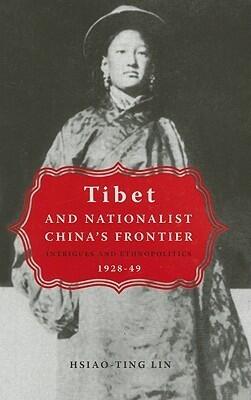
Tibet and Nationalist China's Frontier: Intrigues and Ethnopolitics, 1928-49
von
Hsiao-ting Lin
Noch keine Bewertungen
History
Format
Gebundene Ausgabe
Seiten
304
Sprache
Englisch
Veröffentlicht
Oct 6, 2006
Verlag
UBC Press
ISBN-10
0774813016
ISBN-13
9780774813013
Beschreibung
Hsiao-ting Lin presents an insightful exploration of the intricate relationship between Tibet and Nationalist China from 1928 to 1949. This comprehensive analysis delves into the geopolitical maneuverings and ethnopolitical dynamics that shaped the region during a time of significant transformation. The author meticulously examines the various actors involved, including local authorities, Tibetan leaders, and Nationalist forces, highlighting their motivations and the impact of their interactions.
Lin's work reveals how the interplay of nationalist aspirations, ethnic identities, and cultural narratives influenced policy decisions and territorial claims. The book navigates through a series of key events, illustrating how Tibet emerged as a focal point of intrigue and strategic importance within Nationalist China's broader agenda. The narrative unfolds against a backdrop of shifting alliances and emerging tensions, providing readers with a nuanced understanding of the era's complexities.
The author also pays close attention to the voices of the Tibetan people, shedding light on their experiences and perspectives within the context of larger political shifts. Lin’s analysis not only enriches the history of Tibet but also offers critical insights into the formation of modern Chinese identity and national boundaries.
By synthesizing a wealth of primary sources and employing a multidimensional approach, Lin challenges existing narratives and invites readers to reconsider the significance of Tibet in the historical framework of Nationalist China. This work stands as an essential contribution to the fields of history, ethnopolitics, and Chinese studies, offering a compelling look at a pivotal era marked by conflict, ambition, and cultural interchange.
Lin's work reveals how the interplay of nationalist aspirations, ethnic identities, and cultural narratives influenced policy decisions and territorial claims. The book navigates through a series of key events, illustrating how Tibet emerged as a focal point of intrigue and strategic importance within Nationalist China's broader agenda. The narrative unfolds against a backdrop of shifting alliances and emerging tensions, providing readers with a nuanced understanding of the era's complexities.
The author also pays close attention to the voices of the Tibetan people, shedding light on their experiences and perspectives within the context of larger political shifts. Lin’s analysis not only enriches the history of Tibet but also offers critical insights into the formation of modern Chinese identity and national boundaries.
By synthesizing a wealth of primary sources and employing a multidimensional approach, Lin challenges existing narratives and invites readers to reconsider the significance of Tibet in the historical framework of Nationalist China. This work stands as an essential contribution to the fields of history, ethnopolitics, and Chinese studies, offering a compelling look at a pivotal era marked by conflict, ambition, and cultural interchange.
Rezensionen
Noch keine Rezensionen
Sei der Erste, der dieses Buch rezensiert und deine Gedanken teilt
Erste Rezension hinzufügenLesetagebuch
Keine Lesetagebücher gefunden
Beginne deinen Lese-Fortschritt zu verfolgen, um Log-Einträge hier zu sehen
Füge dein erstes Lesetagebuch hinzuNotizen
Transaktionsprotokoll
Keine Transaktionsprotokolle gefunden
Beginne, deine Buchtransaktionen zu verfolgen, um Log-Einträge hier zu sehen
Fügen Sie Ihr erstes Transaktionsprotokoll hinzu


















